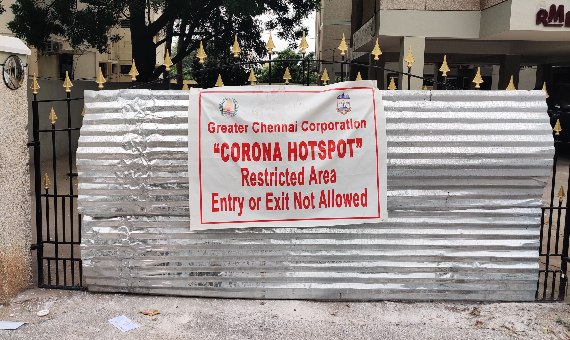- “Countries that chose to prioritize the economy over health are regressing. They have not understood the message.”
- Regarding the post-COVID recovery: “No one can change anything on an individual level. We have to work on a collective level.”
- “We have to change the way we research and showcase knowledge.”
Jaime del Barrio Seoane received his degree in Medicine from Cantabria University and was also Health Counsellor and a Member of Parliament in the same region. In addition to his experience as a researcher in the medical field, he currently presides over the Digital Health Association, a non-profit organization that participates in the debate over the use of Information and Communication Technologies (ICTs) in the field of medicine and health. Jaime del Barrio also works in the Healthcare and Life Sciences division of the consulting firm Ernst & Young. OpenMind spoke with him to analyze the future of scientific research, medicine and society following COVID-19.
When it comes to evaluating the peculiarities of the COVID-19 pandemic compared to other historic pandemics like the Spanish Flu, del Barrio knows that every pandemic marks a turning point for civilizations, but what is unique to this one? “Without a doubt the context. In other words, humanity right now is highly superior to humanity in the last century, for example, and continues to grow exponentially. In thirty years we will be talking about two billion more people.” However, del Barrio clarifies, “The way in which pandemics appear is not different. They are all very similar. In other words, there has to be a causal agent and there have to be some recipients; the place where it develops and how it spreads will condition the damage it will cause.”

A differentiating factor for the doctor is that there is currently better public health, as “Previous pandemics forced us to get up to speed in terms of hygiene, potable water, in other words everything that makes up public health. Technology has also changed a lot: we do currently have different ways to diagnose, treat, evaluate, measure, etc.,” apart from social and economic life, which will also be key factors in calculating the impact of any pandemic.
Globalization and digitization: two elements that have marked the pandemic
Other unique aspects of this crisis are without a doubt, globalization and digitization – two elements what del Barrio feels “have changed the context of the world.” An example of this is the phenomenon of fake news and infodemic, disinformation that accompanies the health crisis. “In our context we have identified more than 800 cases of fake news or messages that do not correspond to reality. This is different. In the past, the world never had the volume of information that we have now.”

But, what have we done wrong in a crisis in which we have technological tools and information? In response to the inevitable question of what went wrong, del Barrio responded decisively: “I think that in societies like ours, we arrogantly considered ourselves superior and were even complacent with what we had. And when we saw clear signs that something could occur, we prefered to look the other way. In other words, there were already epidemiological mathematical models that were predicting this pandemic before it occurred. Yet, we were not capable of responding. We are in a second wave. There will probably be a third before we have an effective treatment and vaccine, but so far, the only thing we have been able to do is the same thing we did during pandemics 100, 200 or 300 years ago which was: hygiene measure, social distancing, limiting crowds, etc.”
“We are in a second wave. There will probably be a third before we have an effective treatment and vaccine, but so far, the only thing we have been able to do is the same thing we did during pandemics 100, 200 or 300 years ago which was: hygiene measure, social distancing, limiting crowds, etc.”
Regarding the management of the crisis, del Barrio points to two fundamental factors to understand the differences among countries: “In countries where the reference was clear and transparent, the numbers and the impact were much better. The opposite in countries where it was not clear who the competent authority was, where the messages were contradictory – I’m not saying fake, but messages that the health authorities or professional colleagues issued were contradictory.”

Another key factor to understand the success or failure of the different COVID-19 strategies would be to assume that the dichotomy between the economy and health is actually a false notion of reality, according to del Barrio: “Countries that chose to prioritize the economy over health are regressing. They have not understood the message.”
A bright future based on cooperation and collective efforts in society
In response to the question of whether this crisis will lead to greater inequality, the doctor is optimistic. “I hope not. I wouldn’t want to see that. We all have to work to ensure that it doesn’t happen. We have to be capable of striking that balance between healthcare and health in the broadest sense of the word. May this be the final pandemic. I have to remain hopeful.”
Jaime del Barrio has the capacity to analyze the health situation in digital terms and thus firmly defends that: “The tools that will greatly change our way of life are related to the data economy, properly utilized artificial intelligence, a model of society in which professionals no longer hold a position due to what they are, but based on what we contribute because no one can change anything on an individual level. We have to work on a collective level, collaboratively and in a cross-cutting manner.”
This unit is essential when it comes to sustainability – a challenge for which del Barrio calls for immediate action: “We have spent too many years living with headlines, empty words that lack content. When I refer to health, I am referring to health in the broadest sense of the word. For me, health is the surroundings, the environment. None of the Sustainable Development Goals can be achieved without an adequate social and healthcare system. In order to address the sustainability challenge, del Barrio calls for change in the education model: “Education that is much more cross-cutting, much more holistic. I think the training we receive at college, in the academic world, is from another time period.”

Finally, in response to the question regarding the scientific advances that allow us to combat this and subsequent pandemics, del Barrio is optimistic regarding the future of science and has confidence in the potential of the science and technology duo – two allies he considers indispensable: “What has changed in this pandemic is that now data and information have been used in an optimal way thanks to new technologies.” A prime example is the COVID-19 vaccine, which, as the doctor explains,“It will be possible to have it in two years thanks to the inclusion of technology in the scientific method, making things like patient recruitment easier.”
However, del Barrio is aware that in order for technology to be used to its full potential, an adequate regulatory framework is needed: “Regulation from ten, fifteen years ago does not help, and I’m referring to a global level and a local level as well.” Furthermore, Jaime del Barrio maintains that based on the long-term approach to medical advances, “If we combine both historic and pre-historic times, there have been no major changes in humanity. We are likely on the threshold of great change.” This change could come with a new lifesaver of science that “unites both health and the economy, with a much more disruptive vision of what we have known thus far. A vision that is much more real, listening more to people, listening more to society than what we have now.” In the short-term, del Barrio is also optimistic regarding the recovery from this health crisis: “I hope and I believe that it will be much faster than the pandemic has been.”
Comments on this publication